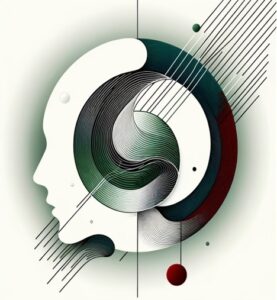Introduction
Emotional literacy is not evenly distributed.
While the capacity to feel, name, and regulate emotion is universal in potential, it is differentially nurtured—and often differentially punished—across gendered lines. Cultural scripts around masculinity, femininity, and gender nonconformity shape the emotional lives of individuals from early childhood, often in ways that are invisible until they become pathological. Emotional suppression is not random; it is encoded in systems. It is socialized. And in many cases, it is required for survival.
This essay examines how patriarchy, gender norms, and trauma intersect to create distinct emotional burdens for men and marginalized genders, and explores the psychological and political work of re-learning emotional literacy in a landscape that has long rendered it suspect.
The Emotional Cost of Masculinity
From infancy, boys in many cultures receive a narrow emotional curriculum. They are more likely than girls to be left to cry longer without comfort, less likely to be spoken to about feelings, and more likely to be redirected or silenced when expressing distress. These early experiences send a message: You are expected to manage your emotions alone.
By adolescence, many boys have internalized the masculine emotional code: stoicism, invulnerability, and the suppression of fear, sadness, tenderness—even joy—emotions deemed “unmanly” or “weak.”
Research in developmental psychology confirms that by age five, children already associate sadness and vulnerability more with girls than boys. By adolescence, boys are significantly less likely to seek support, less emotionally expressive in peer relationships, and more likely to externalize distress through aggression or withdrawal. The suppression of vulnerability is not simply a preference; it is a survival strategy under patriarchy.
But this strategy has costs: depression masked as irritability, anxiety converted into control, grief expressed only through silence or substance. Emotional literacy becomes not just underdeveloped—it becomes disavowed. For many men, especially those raised under rigid masculine ideals, feelings must be either denied or managed through domination—of the self, others, or environment.
Marginalized Genders and the Double Bind
For women and gender-diverse individuals, the emotional landscape is shaped not by absence, but by overexposure. Where men are told not to feel, women and nonbinary people are often expected to feel for others. Emotional expressiveness is permitted, but only within socially sanctioned roles: caretaker, empath, support system.
Anger, assertiveness, or grief that exceeds decorum is pathologized—labeled as hysteria, instability, or ungratefulness.
This results in what Arlie Hochschild termed emotional labor—the expectation that marginalized genders will not only feel their own emotions but also manage the emotional needs of others, especially those in power. Emotional labor is unpaid, unnoticed, and unreciprocated. It extracts energy without consent. And it teaches a distorted emotional lesson: Your value lies in your attunement to others, not your authenticity to self.
For queer, trans, and nonbinary individuals, the terrain is more complex still. Emotional expressions may be scrutinized, politicized, or erased. They are punished both for conforming to and for defying gendered emotional expectations. Authenticity becomes a risk. Emotional survival often requires code-switching, compartmentalization, or vigilance.
Sometimes, safety requires hiding how it actually feels to be alive.
Trauma, Patriarchy, and the Loss of Feeling
It is impossible to disentangle emotional restriction from trauma. Many forms of trauma—especially developmental and systemic trauma—are internalized through affective disruption: the suppression of emotional truth to preserve attachment, safety, or social inclusion.
Patriarchy itself is a traumatizing system. It disconnects men from their inner world by linking openness to weakness. It burdens women and marginalized genders with the responsibility of emotional regulation—for everyone but themselves. It creates a double bind in which no one is permitted full emotional subjectivity without cost.
Over time, these conditions generate what Judith Jordan calls chronic disconnection—a state in which the individual no longer trusts emotion to be safe, responsive, or meaningful. Emotional literacy is not merely undeveloped—it is seen as dangerous or irrelevant. This is not a personal failure. It is the result of systems that made emotional suppression a survival strategy.
The Work of Undoing
To reclaim emotional literacy under these conditions is not just healing—it’s political. Psychological. Relational. It requires not only learning a new vocabulary, but unlearning the script that made emotion a liability in the first place.
In a men’s group, one participant—a former soldier—broke down mid-sentence:
“I’ve never told anyone I was scared. Not once. Not even my wife.”
He didn’t need feedback. Just the space to say it aloud, and not be shamed for it. That, too, is emotional literacy: naming what has never been named.
For men, this work means grieving not just losses, but entire emotional selves that were never allowed to form. It means learning that strength without softness is only armor. And that the need to be held does not make you weak—it makes you human.
For marginalized genders, it means reclaiming emotional expression as sovereign, not service-oriented. It means setting boundaries around emotional labor. Refusing the inherited role of container. Validating rage, numbness, grief—not as dysfunction, but as intelligent responses to chronic emotional overuse and erasure.
Healing practices that support this work must be attuned to power, context, and consent. Emotion-focused therapies, somatic work, and gender-liberatory group spaces can offer essential scaffolding. The task is not just to feel—but to feel safely, without fear of exile or exposure.
Conclusion: Toward Emotional Justice
Emotional literacy is not merely an individual skill—it is a form of cultural resistance. It is the radical reclamation of full humanity from systems designed to fragment it.
This reclamation is not a return to neutrality—it’s a revolution.
To feel fully is to become sovereign over your emotional life. It is to refuse the roles assigned by patriarchy and instead speak from truths that begin in the body, pass through the heart, and emerge without apology.
We do not all begin with the same emotional permissions.
But we do not have to end where we began.



